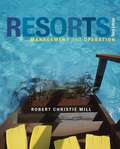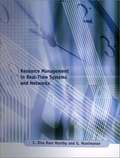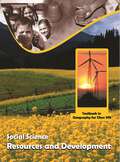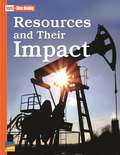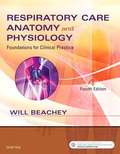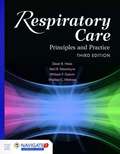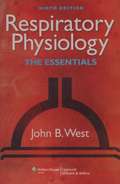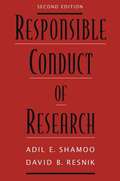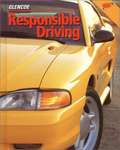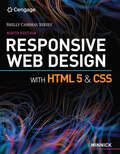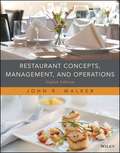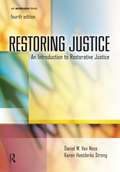- Table View
- List View
Resonance class 12 - Meghalaya Board
by Meghalaya Board of School EducationThe book Resonance for Class XII of Meghalaya Board is a Core English book. It focuses on enabling the students to become independent readers, honing language skills such as listening, speaking, reading and writing, equipping students with the vocabulary required to function effectively in their professional lives, developing a taste for reading quality material, acquiring analytical and critical thinking and sharpening language skills to be able to cope with learning the other subjects. Lessons have been devised and prepared to take the students from the known to the unknown and to develop communication skills in the young learners preparing them to deal with day-to-day problems and enhance their life experiences.
Resorts: Management and Operation (Third Edition)
by Robert Christie MillThe 3rd Edition of Resorts: Management and Operation is a summary of almost 30 years of thought, analysis, and research into the field of resort management written from a business viewpoint yet takes into account the unique structure of resorts. The text is divided into three sections. Each section has a philosophical basis for the inclusion of the subsequent principles and practices. The first section covers major types of resorts: those that are mountain-based, beach-based and golf/tennis based. Two chapters are devoted to each of the various resort types. The first chapters of each resort type focuses on development issues with the impact on operations noted throughout. The second chapter in each resort type deals with guest profiles and management issues. The second section highlights what makes managing a resort different from managing a 'regular' hotel. The final section features a newly expanded chapter on spas, pools, and indoor water parks along with individual chapters on specialty resorts, cruise ships and casinos, reflecting the importance of these types of properties.
Resource Guide for Assessment of Children: Cognitive Foundations and Applications
by Jerome M. SattlerThis volume provides extensive tables to help in interpreting the WISC-V, WPPSI-IV, SB5, DAS-II, and WJ IV COG. It also contains appendixes focusing on laws pertaining to children with special needs (IDEA, Section 504, and ADA), testifying as an expert witness, and test reviews.
Resource Management in Real-Time Systems and Networks
by C. Siva Ram Murthy G. ManimaranReal-time systems and networks are of increasing importance in many applications, including automated factories, telecommunication systems, defense systems, and space systems. This book introduces the concepts and state-of-the-art research developments of resource management in real-time systems and networks. Unlike other texts in the field, it covers the entire spectrum of issues in resource management, including task scheduling in uniprocessor real-time systems; task scheduling, fault-tolerant task scheduling, and resource reclaiming in multiprocessor real-time systems; conventional task scheduling and object-based task scheduling in distributed real-time systems; message scheduling; QoS routing; dependable communication; multicast communication; and medium access protocols in real-time networks. It provides algorithmic treatments for all of the issues addressed, highlighting the intuition behind each algorithm and giving examples. The book also includes two chapters of case studies.
Resources And Development class 8 - NCERT - 23 (Geography)
by National Council of Educational Research and Training"RESOURCES AND DEVELOPMENT" is a Geography textbook designed for Class VIII, focusing on the fundamental concepts of resources and their sustainable development. The textbook explores the diverse range of resources available on Earth, including natural resources like land, water, minerals, and forests. It delves into the geographical distribution of these resources, emphasizing the significance of their judicious utilization. The text introduces students to the concept of resource planning and management, encouraging an understanding of the delicate balance between resource exploitation and conservation. Through case studies and practical examples, the textbook aims to cultivate an awareness of environmental issues and the need for responsible resource use among the students, laying the foundation for a holistic understanding of geography and sustainable development.
Respectfully Yours (Fountas & Pinnell Classroom, Guided Reading Grade 6)
by Jill Rubalcaba Drew BardanaA Tough Assignment? Ben needs help from a homeless man to complete a school assignment. Will he get it? NIMAC-sourced textbook
Respiratory Care Anatomy And Physiology: Foundations For Clinical Practice
by Will BeacheyPrepare to think critically, take a more clinical perspective, and connect theory with practice! Written specifically for respiratory care students in an easy-to-understand format, Respiratory Care Anatomy and Physiology: Foundations for Clinical Practice, 4th Edition details applied respiratory and cardiovascular physiology and how anatomy relates to physiological functions. Content spans the areas of detailed anatomy and physiology of the pulmonary, cardiovascular, and renal systems, and covers the physiological principles underlying common therapeutic, diagnostic, and monitoring therapies and procedures. Thoroughly updated to reflect changes in the NBRC exam, this comprehensive, clinically relevant text features open-ended concept questions that help you learn how to think like the expert you aim to become.
Respiratory Care: Principles And Practice
by Dean R. Hess Neil R. Macintyre William F. Galvin Shelley C. MishoeWith contributions from over 75 of the foremost experts in the field, the third edition of best-selling Respiratory Care: Principles and Practice represents the very best in clinical and academic expertise. Taught in leading respiratory care programs, it continues to be the top choice for instructors and students alike. The Third Edition includes numerous updates and revisions that provide the best foundational knowledge available as well as new, helpful instructor resources and student learning tools. Respiratory Care: Principles and Practice, Third Edition is a complete and up-to-date exploration of the technical and professional aspects of respiratory care. With foundations in evidence-based practice, this essential resource reviews respiratory assessment, respiratory therapeutics, respiratory diseases, basic sciences and their application to respiratory care, the respiratory care profession, and much more. Respiratory Care: Principles and Practice, Third Edition incorporates the latest information on the practice of respiratory care into a well-organized, cohesive, reader-friendly guide to help students learn to develop care plans, critical thinking skills, strong communication and patient education skills, and the clinical leadership skills needed to succeed.
Respiratory Physiology: The Essentials 9th Edition
by John B. WestWidely considered the gold standard for the teaching and learning of respiratory physiology, this fully updated Ninth Edition includes key points for each chapter and multiple-choice review questions and answers with full explanations.
Responding to Literature (Blue Level)
by Susan Duffy Schaffrath Ursula Mcpike David W. Foote Brenda P. PerkinsA literature and language arts textbook
Responding to Literature: American Literature
by Arthur N. Applebee Judith A. Langer Julie West JohnsonAmerican Literature textbook
Responding to Literature: World Literature
by Mary Hynes-Berry Basia C. Miller Susan D. Schaffrath Rebecca Hankin Ted Johnson Ursula McpikeResponding to Literature is a series for the way you really read, the way you really think, the way you really write. As you use this book in the series, you will learn new ways of exploring literature, and you will discover personal meanings in works that are part of your literary heritage.
Responsible Conduct of Research (2nd edition)
by David B. Resnik Adil E. ShamooResponsible Conduct of Research provides an introduction to many of the social, ethical, and legal issues facing scientists today. The fully updated volume includes three brand new chapters and additional cases for discussion, as well as analysis of the latest issues and problems in research ethics. Featuring chapters that treat such topics as ethical decision-making, research misconduct, and intellectual property, this new edition will be an indispensable resource for students and teachers, academics and industry professionals alike.
Responsible Driving
by Mcgraw-Hill Staff American Automobile Association StaffThis classroom-tested program, developed with the American Automobile Association (AAA), has been updated to reflect the changes surrounding teen driving. Everything your students need to know about driving is included - from graduated driver licensing to zero tolerance laws to information about vehicle maintenance. There's even a new chapter that emphasizes the facts about driving today's larger, heavier sport utility vehicles, pickup trucks, and vans.
Responsive Web Design with HTML 5 and CSS
by Jessica MinnickCombining best practices with the most up-to-date tools available, Minnick's RESPONSIVE WEB DESIGN WITH HTML 5 & CSS, 9th edition, walks your students step by step through the process of creating effective websites that drive traffic and retain customers. It provides a solid foundation in HTML and CSS concepts before diving into responsive web design -- which is essential for today's websites. Students learn how to design websites for mobile devices, tablets, laptops, desktops and very large monitors -- from a single-column layout to a multiple-column layout. Packed with tips from the pros, the text illustrates how to use HTML 5 elements and a variety of CSS properties, including more advanced tools such as grid layout, shadows, gradients, transforms and animations. Students also learn how to embed a map, integrate custom fonts within a website, create a working hamburger menu and more.
Restaurant Concepts, Management, and Operations
by John R. WalkerRestaurant Concepts, Management, and Operations, 8th Edition features comprehensive, applications-based coverage of all aspects of developing, opening, and running a restaurant. This includes topics such as staffing, legal and regulatory concerns, cost control and general financing, marketing and promotion, equipment and design, the menu, sanitation, and concept. A one-stop guide to the restaurant business, the Eighth Edition of Walker's, Restaurant Concepts, Management, and Operations continues the success of previous editions, providing, in an easy-to-read way, all of the skills and information needed to master every challenge and succeed in this highly competitive and rewarding industry. Each chapter has been revised, updated, and enhanced with numerous industry examples, sidebars, charts, tables, photographs, and menus. All of this information will help restaurant owners make the decisions necessary to build a thriving business.
Restoring Justice: An Introduction to Restorative Justice (4th Edition)
by Daniel W. Van Ness Karen Heetderks StrongThe book presents a theoretical foundation for the principles and values of restorative justice and develops its four cornerpost ideas of encounter, amends, inclusion and reintegration. It explores the broad appeal of this new vision and offers a brief history of its development. After exploring how restorative justice ideas and values may be integrated into policy and practice, it presents a series of key issues commonly raised on restorative justice, summarizing various perspectives on each.
Retailing Management
by Dhruv Grewal Michael Levy Barton A. WeitzLevy Retailing Management focuses on the broad spectrum of Canadian and international retailers, both large and small, that sell merchandise or services. The text uniquely examines key strategic issues with an emphasis on the financial considerations and store management issues that are particular to the Canadian experience. The Fourth Canadian Edition includes substantial new content on social media and mobile marketing to the multichannel discussion, a more in-depth treatment of the impact of technology on the retail communications mix, and a new chapter dedicated to information systems and supply chain management. As with previous editions, Retailing Management reflects the evolving nature of retailing, including up-to-date data, current and Canadian examples, and cutting edge information on trends in retailing.

